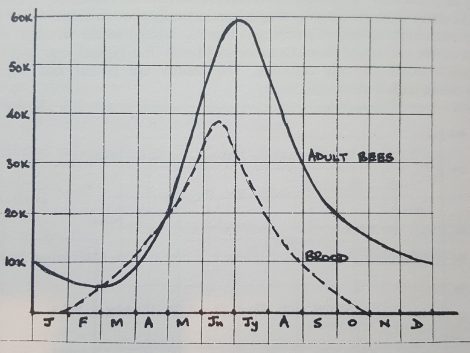 Abraham Lincoln
If given the truth, the people can be depended upon to meet any national crisis...
Abraham Lincoln
If given the truth, the people can be depended upon to meet any national crisis...
 Guildford news...
for Guildford people, brought to you by Guildford reporters - Guildford's own news service
Guildford news...
for Guildford people, brought to you by Guildford reporters - Guildford's own news service
Beekeeper’s Notes: Critical Time For Bees
Published on: 1 Feb, 2021
Updated on: 30 Jan, 2021
Hugh Coakley keeps bees in Worplesdon
It is a quiet time of the year for bees and beekeepers. The current talk is about how our colonies are doing in the winter but also the ‘thin end of the wedge’ concern that the government is allowing the use of neonicitinoid pesticide as an emergency treatment for the sugar beet crop.
Honey bee colonies are approaching their lowest population at this time of year. The queen will be starting to lay again after her winter rest. She starts slowly at first, presumably to match the amount of pollen protein that the workers can provide to nurture the larvae. She is starting to replace the worker bees that naturally die over the winter.

Average bee colony population against queen laying (from Beekeeping Study Notes by JD & BD Yates).
The workers live around six weeks of productive life but those that are born just before the winter can live for four months or more.
It is suggested that they last longer because they don’t have to work as hard. The can’t forage as much so they don’t have the punishing workload of flying up to five miles and back with a shopping bag of nectar or pollen on their back legs.
So now is a critical time for the colony. I know that one of my colonies hasn’t made it. Fingers crossed for the other four.
 The other issue has been the government’s decision to allow emergency use of the banned neonicitinoid pesticide. It was banned by the EU in 2018 because of its harmful affect on bees. The beekeeper’s magazine, BBKA news, say that it has been allowed as an emergency measure 21 times in Europe in 2020.
The other issue has been the government’s decision to allow emergency use of the banned neonicitinoid pesticide. It was banned by the EU in 2018 because of its harmful affect on bees. The beekeeper’s magazine, BBKA news, say that it has been allowed as an emergency measure 21 times in Europe in 2020.
It is complicated. Farmers are reported to be relieved after suffering a “devastating season”. But with insects numbers plummeting, is it right?

See Dragon story: GBC’s Explanation of Major Land Sale Notice Error ‘Borders on Arrogant’ Says Councillor







Recent Articles
- Drug Gang Jailed: Their Activities Were Directed From Behind Bars, Court Told
- Planning Inspector Allows Another High-rise for Woking
- Letter: Why These False Flag Political Stunts?
- Highly Regarded Joint Strategic Director Quits Guildford & Waverley Councils
- Birdwatcher’s Diary No.302
- Diocese of Guildford Appoints New Registrar and Legal Advisor
- ‘One in Five’ Surrey Police Officers Seeking Another Job
- Insights: Lead from the Front on Values
- New Investment Will Help Surrey Fire and Rescue Service Improve Training Facilities
- Letter: Are the PCC Candidates Relying on Their Party Labels?


Search in Site
Media Gallery
Dragon Interview: Local Artist Leaves Her Mark At One of England’s Most Historic Buildings
January 21, 2023 / No Comment / Read MoreDragon Interview: Lib Dem Planning Chair: ‘Current Policy Doesn’t Work for Local People’
January 19, 2023 / No Comment / Read MoreA3 Tunnel in Guildford ‘Necessary’ for New Homes, Says Guildford’s MP
January 10, 2023 / No Comment / Read More‘Madness’ for London Road Scheme to Go Ahead Against ‘Huge Opposition’, Says SCC Leader
January 6, 2023 / No Comment / Read MoreCouncillor’s Son Starts Campaign for More Consultation on North Street Plan
December 30, 2022 / No Comment / Read MoreCounty Council Climbs Down Over London Road Works – Further ‘Engagement’ Period Announced
December 14, 2022 / No Comment / Read MoreDragon Interview: GBC Reaction to the Government’s Expected Decision to Relax Housing Targets
December 7, 2022 / No Comment / Read MoreHow Can Our Town Centre Businesses Recover? Watch the Shop Front Debate
May 18, 2020 / No Comment / Read More






Recent Comments